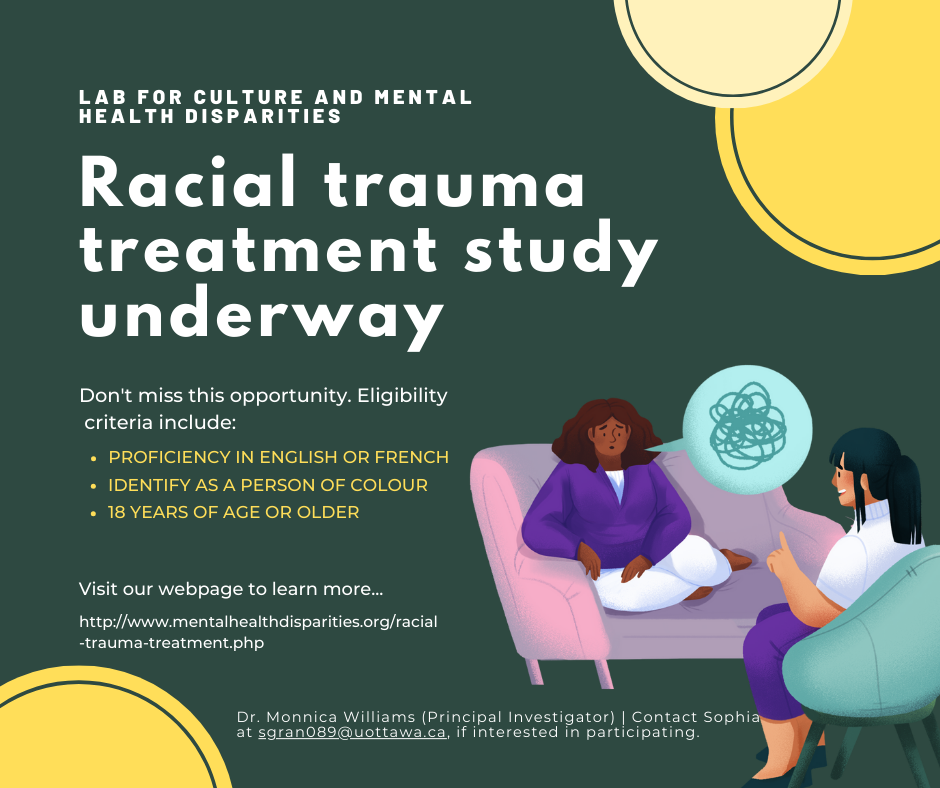Racial Trauma and University Students

Intervention for Racial Trauma
Since racism is not going away anytime soon, it is particularly important to find solutions for those who have been traumatized by their cumulative experiences of racism.
Our lab is studying how a specialized psychotherapy approach — the Racial Stress and Trauma Treatment Protocol — can support university students of colour recovering from racial trauma. It is important to reach this demographic, because their experiences combine the challenges of academic life with the persistent emotional toll of racial discrimination. Racial trauma puts them at increased risk of academic failure, substance misuse, and self-isolation.
Unlike standard clinical approaches, interventions tailored specifically to racial trauma must acknowledge the culturally-specific manifestations of anxiety, depression, and PTSD symptoms triggered by repeated microaggressions, larger acts of discrimination, and/or systemic bias. By addressing these distinct factors, effective treatment can help students develop coping strategies, promote resilience, and restore a sense of empowerment, ultimately improving their overall well-being and academic success. Moreover, creating an effective treatment model can inform university support services, guide training for mental health professionals, and help create a more inclusive campus environment that actively mitigates the psychological harm caused by racial discrimination.
Related Works
Williams, M. T. (2019). Adverse racial climates in academia: Conceptualization, interventions, and call to action. New Ideas in Psychology, 55, 58-67.

Understanding the Impact of Racism in University Students
A recent study we conducted at the University of Ottawa shines a spotlight on the troubling intersection of racial discrimination and mental health challenges among students of color. Drawing on data from 403 students, we found that racial discrimination — be it in the form of subtle day-to-day microaggressions or more systemic prejudice — is correlated to higher levels of stress, trauma, and depressive symptoms. In short, the more frequently these students experience racism, the more likely they are to experience emotional distress that can significantly impact their well-being and academic success.
Microaggressions on Campus
Microaggressions often appear as seemingly “minor” slights, but they add up over time, leaving a profound psychological imprint. The most common forms reported included assumptions that students of color are “foreigners” and a pervasive sense of underrepresentation, whether in leadership positions or learning materials. Black students, in particular, reported disproportionately higher rates of these microaggressions and greater trauma symptoms than any other marginalized group. This disparity underscores how deeply rooted anti-Black racism continues to harm mental health.
Campus Climate
When asked about the overall racial climate on campus, the responses were telling: nearly 40% said that race relations are “extremely” or “somewhat” problematic, while about 41% considered them “a little” problematic, and only 20% saw no problem at all. Interestingly, while campus life itself was noted to have fewer microaggressions than the wider city environment, these harmful acts were still prevalent enough to cause real pain. Our findings also reveal that as students of color experience racial microaggressions more frequently, their likelihood of developing racial trauma symptoms — similar to those experienced in post-traumatic stress — significantly increases.
This research builds upon prior work in our lab on racial microaggressions, confirming that what many may brush off as “small” incidents can have severe and lasting psychological consequences. Persistent exposure to assumptions based on stereotypes, exclusion, or hostility erodes a person’s sense of safety and belonging. Understanding this is key if we are to create healthier, more inclusive academic environments. We must recognize the deep emotional toll that racism takes on those who live through it, and take steps to address and dismantle it at every level.
